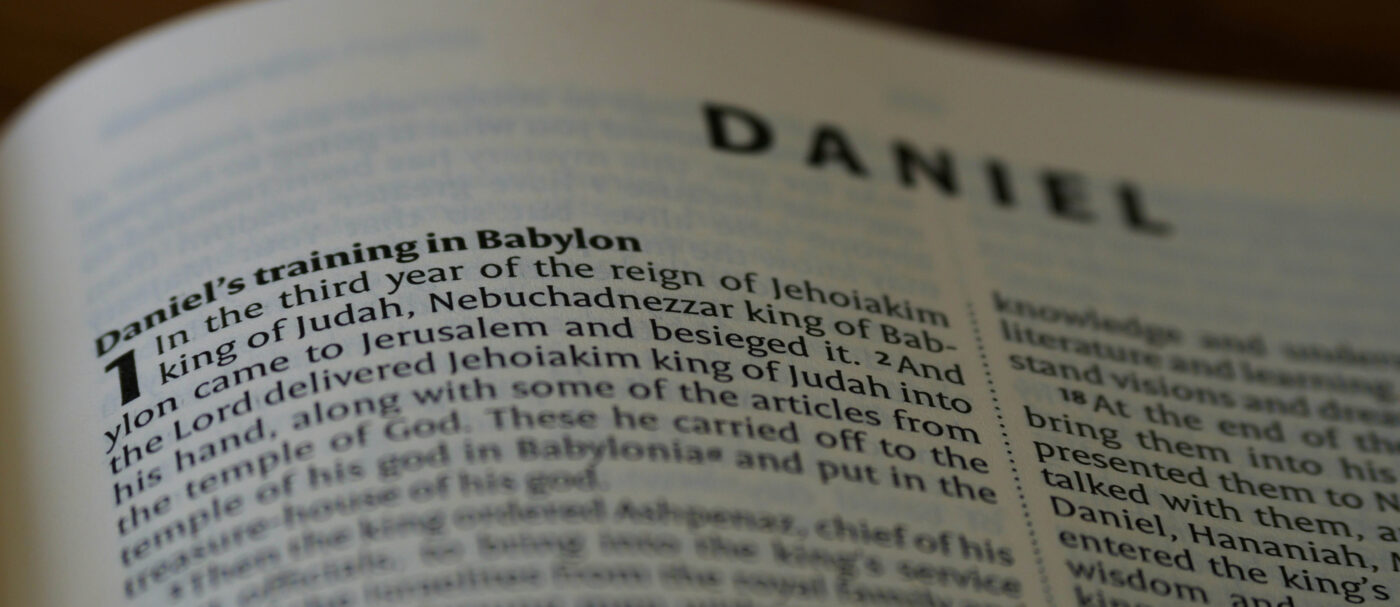Lessons from Daniel 1: Resolving to Obey at all Cost
The following is the first of a four-part message Pastor Corbett Casteen, with Liberty Live Church, delivered during this year’s Upper School Retreat, Sept. 16-18.
This year’s theme, “Summit: Forged for the Climb,” is based on 2 Peter 1:3–11 which reminds believers that God has already equipped them for a godly life. Peter encourages Christians to grow in faith and pursue spiritual maturity, to keep climbing even when the journey is difficult. But how do we stay faithful in a culture that pulls us in every other direction? Daniel’s life shows us what it looks like to live for God in a world that doesn’t.
Daniel’s World vs. Our World
Daniel was taken from Jerusalem when Babylon besieged the city during King Jehoiakim’s reign. Exiled with three other Hebrew youths, he entered a culture filled with power, prestige, and polytheistic worship designed to strip them of their identity, reshape their beliefs, and rewire them to live, think, and believe like Babylonians. Babylon didn’t just capture people; it worked to conform them.
Sound familiar?
We live in a world that isn’t just passively ungodly—it’s often aggressively so. The culture around us wants to reshape how we think, speak, and act. Social media, entertainment, and institutions can push narratives that are far from the heart of God. It’s not that being a Christian was ever easy, but the challenges of today require us to live with clarity, courage, and conviction.
Babylon’s Strategies Still Exist
The tactics of Babylon to conform young people haven’t changed. In Daniel 1, we see three strategies used—and they’re the same ones our culture uses today:
- Isolation. Daniel and his friends were taken from their home, their faith community, and placed in a foreign land. Today, young people are more connected than ever digitally, yet more isolated than ever emotionally and spiritually. Social media promises community, but often delivers loneliness, echo chambers, and superficiality. Real growth happens in true community, not just online spaces.
- Indoctrination. The young Hebrews were taught Babylonian literature, language, and worldview. Similarly, our world constantly communicates messages—about identity, success, sexuality, and truth—that often contradict God’s Word. If we aren’t grounded in Scripture, it’s easy to be swayed by persuasive lies.
- Identity Confusion. Daniel and his friends had names that honored the one true God. Babylon gave them new names that honored pagan gods. In the same way, culture today tries to define you by everything except who God says you are—your feelings, your followers, your failures. But 1 Peter 2:9 says you are “a chosen race, a royal priesthood, a holy nation, a people for his own possession.” Your identity is secure in Christ.
The Choice to Obey — Setting Your Resolve
In the face of these pressures—tactics designed to reshape his identity and loyalty—Daniel’s response stands out as a model for us today. In Daniel 1:8, we read a pivotal verse: “But Daniel resolved that he would not defile himself…” He drew a line. He decided in advance where he would stand.
What was so wrong with the king’s food? To start, it was likely sacrificed to idols, not kosher, or otherwise spiritually compromising. But more important than the reasons for abstaining from it was Daniel’s resolve to be faithful in his convictions. He didn’t wait until the pressure was on—he made a firm decision in advance: I will not compromise.
If you want to live for God in an ungodly world, it starts with that same kind of resolve. Faithful obedience is not based on circumstances or convenience. It’s a daily decision to follow Jesus, no matter the cost.
The Cost of Obedience — Standing Against the Current
That kind of unwavering commitment doesn’t happen by accident. It’s the result of a deliberate choice to honor God—regardless of what it might cost. And let’s be honest: obedience to Christ will cost you something.
Daniel stood up for his faith in a high-risk situation. He wasn’t a free man; he was a captive. By refusing the king’s food, he risked humiliation, punishment, or death. But he chose faithfulness over fear.
You might not face death for your faith, but you will face opposition. You might be misunderstood by friends or family, unfollowed on social media for sharing truth that cuts against the grain, or quietly excluded from conversations, circles, or opportunities because you refuse to compromise your convictions. Standing for Christ in a culture that often celebrates comfort and conformity can make you feel isolated—but you’re never alone. Jesus didn’t sugarcoat it: “If anyone wants to follow me, let him deny himself, take up his cross, and follow me” (Matthew 16:24).
Let’s be even bolder: if following Jesus hasn’t cost you anything—your comfort, convenience, your relationships, your pride—then it’s worth asking if you’re truly following Him: That’s not condemnation—it’s a loving invitation to deeper discipleship.
Obedience means:
- You don’t watch what everyone else watches.
- You don’t speak the way others speak.
- You don’t find identity in what culture says you should.
- You might lose popularity, friendships, or comfort.
But what you gain is infinitely more valuable.
The Reward of Obedience — Experiencing God’s Favor
This kind of obedience is costly—but it’s in that very sacrifice that we make room for something far greater: the favor and presence of God. Here’s the hope: God always blesses obedience.
After Daniel and his friends obeyed, Scripture says they were healthier, wiser, and more equipped than all the others. But don’t miss this: their blessing wasn’t just a result of a better diet—it was because God’s hand was on them.
“God gave them learning, skill, wisdom, understanding…” (Daniel 1:17)
When you walk in obedience, you open your life to God’s supernatural power and provision. God will equip you for every good work. He will give you favor that makes no sense to the world.
Too many Christians live spiritually stuck—saved but not surrendered. Rescued, but still holding on to parts of their old life. That’s why we often feel frustrated or empty.
But as Paul told Timothy in 1 Timothy 6:19, “take hold of that which is truly life.” Jesus didn’t come just to give us rules—He came to give us abundant life (John 10:10). But that life comes through surrender.
So What Now?
You have a choice. Do you keep chasing a version of life that leaves you empty, or do you take hold of the life that’s truly life—the one Jesus offers?
- Will you assimilate or stand out?
- Will you obey, even when it’s hard?
- Will you count the cost—and still say “yes” to Jesus?
- Will you trust that God’s reward is worth it?
Daniel’s example wasn’t just about food or names. It was about a man of God who chose to live faithfully in a culture that opposed everything he believed. He didn’t blend in—he stood firm. And God honored it.







